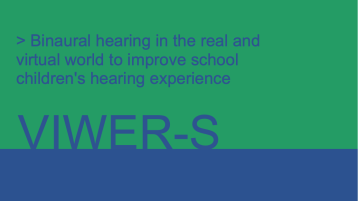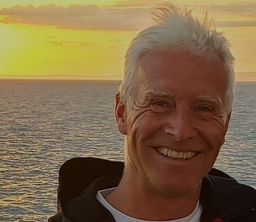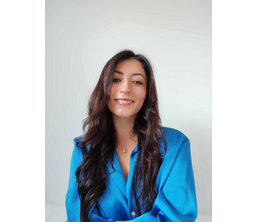Research project VIWER-S

Binaural hearing in the real and virtual world to improve school children's hearing experience (VIWER-S)
The VIWER-S project aims to improve the hearing experience of school children. In cooperation with the Jade University of Wilhelmshaven / Oldenburg / Elsfleth, we are developing aids to enhance the hearing capabilities of children with a weakness in spatial auditory perception.
Children with what is known as a spatial processing disorder (SPD) have difficulty locating and filtering sounds in the room. Their ability to hear is not impaired. According to audiometry tests, their outer and middle ear work appropriately, and their hearing is in the normal range. However, they have a disorder that results from a breakdown in the brain's listening processing abilities.
In short, the brains of people with any auditory processing disorder cannot fully understand the information contained in sound. In the specific case of children with SPD, they have a reduced ability to use the binaural cues to selectively attend to sounds arriving from one direction while simultaneously suppressing sounds coming from another. This ability is essential to follow conversations in environments with a lot of background noise. As a result, they often have learning difficulties because they can hardly follow the lessons at school. They fail, for example, to block out conversations from classmates or movement noises. Besides, they often have problems with understanding language and, therefore, with reading and writing.
The VIWER-S project pursues two approaches to help children with SPD:
On the one hand, we want to develop a technical hearing aid. It will consist of a microphone array that picks up sounds from the room, filters them, and passes them on to the child. This way, he/she will perceive them correctly through headphones (as coming from the right direction). More info on this approach can be found at Jadewelt.
On the other hand, in the TH Köln, we focus on building an app that the children can use to train their spatial hearing ability. The app should help the children to playfully train their spatial hearing ability in a familiar environment (for example, at home) and at times of their choice. It will create a virtual reality in which they can act and react intuitively. This way, we avoid the problem of conventional hearing aids. As they only pass on a non-spatial signal from the teacher's microphone to the child, they do not fix or improve their condition in the long term.
We aim to create entirely new forms to support children with SPD. We will create virtual acoustic environments (VAEs) in which they will train directional hearing. The effectiveness of such training has already been well documented. However, the training methods available to date are exclusively intended to improve the language understanding of two competing speakers and omit aspects such as locating objects in the room or room acoustics. Additionally, the currently available methods employ traditional listening training with auditive cues uniquely. They exclude the benefits of multisensory interaction and the sense of immersion that VR and AR experiences can provide. Those multisensory interactions between audition, vision, touch, and proprioception have revealed indispensable associations in the brain which help sound source localization. Thus, we intend to exploit those abilities inside an immersive VR/AR training application designed to improve the binaural processing skills of children diagnosed with a spatial processing disorder (SPD) and support and enhance the learning process by including multisensory stimuli.
After concluding this project, we will better understand the training and learning mechanisms of spatial haring. Moreover, we will use the virtual acoustic environments (VAEs) created in the project in completely different contexts, such as creating virtual acoustics for Industry 4.0 or developing new hearing aids for room acoustics simulation to support people with other hearing impairments.
At a Glance
| Category | Description |
|---|---|
| Research project | Research project VIWER-S |
| Management | Prof. Dr.-Ing Christoph Pörschmann |
| Faculty | Information, Media and Electrical Engineering |
| Institute | Institute for Computer and Communication Technology |
| Persons involved | Christoph Pörschmann, Melissa Ramírez |
| Partners |
Jade University of Applied Sciences Wilhelmshaven / Oldenburg / Elsfleth Dear Reality GmbH, Düsseldorf |
| Sponsors | BMBF (funding line for young engineers) |
| Duration | 01.01.2019 – 31.12.2024 |
 (Image: BMBF)
(Image: BMBF)


